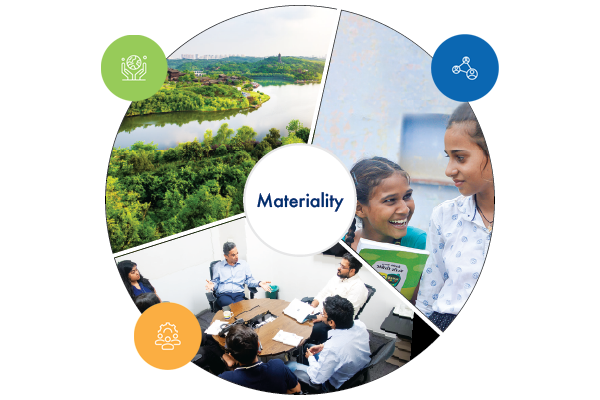Materiality
At Marico, we are striving to lead the industry in terms of environmental and social responsibility across every facet of our business operations and value chains. Concurrently, we are also identifying and mitigating material risks. We are seeking opportunities to innovate and intervene to fast-track growth and benefit all stakeholders.
We are committed to be transparent in communicating our financial and nonfinancial performance to stakeholders and enhance our disclosures in alignment with standard corporate sustainability frameworks.
In FY22, we concluded our first 5-year Sustainability Roadmap. We met all our goals on energy, emissions, packaging, and supplier management. We also undertook leadership roles by initiating development of a product sustainability index and engaging with farmers for sustainable agriculture.
During 2017-22, we achieved 73% reduction in energy intensity and 77.5% reduction in GHG emissions intensity in our operations. Our initiatives around water conservation created 263 Crore litres of water capacity for communities (equivalent to 3 times of water consumption in our operations).
We are working with farmers in order to promote sustainable agriculture practices since FY17. Over 81,000 farmers have been enrolled in Marico’s sustainable agriculture programme, reflecting a y-o-y addition of 15,000+ beneficiaries. A total of 3.11 lakh acres have been brought inside the purview of this programme till date, demonstrating an overall productivity improvement of 16%.
Our flagship programme for responsible sourcing, SAMYUT, has laid out a comprehensive system of supplier evaluation on key criteria of business ethics and environmental and social responsibilities
In FY23, we launched our Sustainability Vision for 2030 on World Environment Day, 5th June 2022. The 2030 vision incorporates emerging expectations from stakeholders including emphasis on ESG performance. We established materiality of ESG topics through an informed engagement with internal and external stakeholders, based on the impact on business and expectations from stakeholders. We have identified 11 core material topics across environment, social and governance pillars to guide our actions for Sustainability Vision 2030. The core criteria consist of key performance indicators and metrics to monitor and communicate our progress to all stakeholders annually.

To operationalise our Sustainability 2.0 Strategy, we have outlined an extensive 8-point commitment to drive change in the following key focus areas:
Marico aims to achieve water neutrality in manufacturing operations and practice water stewardship for creating water availability for the community.
Key enablers are zero liquid discharge at manufacturing facilities, water efficiency in operations, and collaborative actions with communities for water conservation.
We aim to achieve Net Zero Emissions in global operations and mitigate value-chain emissions in line with the 1.5oC scenario.
Key enables for this transition will be renewable energy, investments in low-carbon technology options and carbon forestry.
Marico aims to achieve 100% recyclable packaging by 2025, practise 3R for effective management of pre-consumer and postconsumer waste.
Key enablers are innovations in product design, recovery of materials from waste, and extended producer’s responsibility for postconsumer waste.
Marico believes in fostering a diversity conscious, diversity ready and socially inclusive workplace. Towards this purpose, we target to enhance our gender diversity ratio to 30% and the differently-abled to 5%, as part of our decade of action roadmap.
By 2030, Marico aims to cohere the purpose, messaging, and impact- based actions of its top 5 brands by revenue with the goals and targets outlined by the United Nations Sustainable Development Goals.
Each of the top 5 brands will annually quantify and disclose on the sustainable impacts created y-o-y in adherence to the relevant UN-SDGs, along with targets and indicators.
We continued our efforts to health and nutrition benefits of our food products. We also took steps to assess and reduce product carbon footprint of some of our products.
We aim to boost economic self-sufficiency of farmers. Our plan is to reach the target of 4+ lakh acres of coconut plantation by 2025 and achieve a cumulative productivity improvement rate of 16%.
We aim to empower approximately over one lakh farmers on sustainable agriculture practices. These measures are aimed at improving productivity and enhancing climate resilience.
Marico’s Responsible Sourcing Framework (SAMYUT) is anchored on three pivotal themes – Environmental Stewardship, Ethical Responsibilities and Social Empowerment.
By 2030, we plan to roll out Level 1 (capacity-building and voluntary declaration of commitments) across 100% of our critical suppliers, and Level 2 (independent riskbased external audits to validate voluntary commitments) to 50% of our critical suppliers who have completed Level 1. Additionally, we are setting targets for key metrics such as traceability, preferential procurement of sustainable materials, and the promotion of diversity in our supplier base.
At Marico, all activities are led by a sense of responsibility, underpinned by our principles of good governance. In our decade of action, we will continue to ensure good corporate governance by practising ethical business practices and robust risk mitigation.
Marico’s Sustainability 2.0 framework has been developed with the intent of establishing a dynamic strategy to strengthen the business’s core purpose.
The framework will be guided by our policies and commitments on material issues, available on our website.
We will also leverage this framework to capacitate our value chain partners in building resilient and sustainable business enterprises.
Our sustainability goals are laid on the foundation of stakeholder capitalism, social inclusion, sustainable production and consumption, and above all a long-term positive impact on the communities that help us thrive.